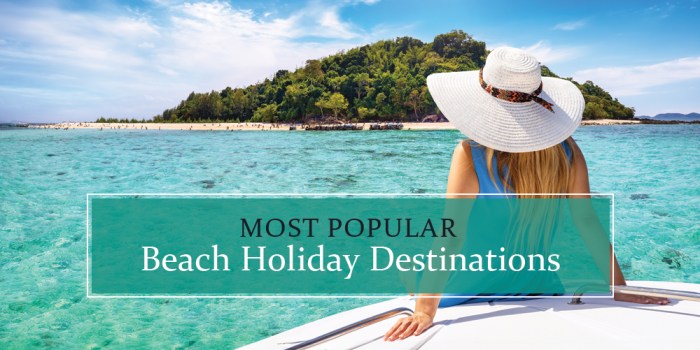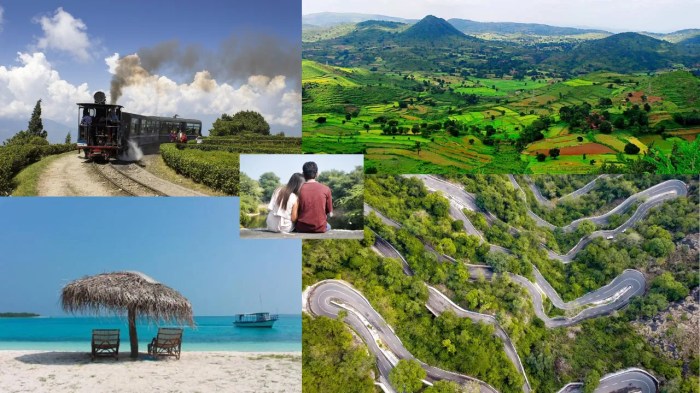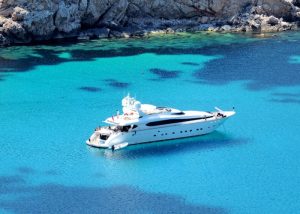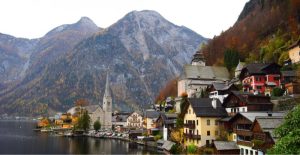
Embark on a journey to discover the best educational travel destinations in 2025, where learning meets adventure and culture in a perfect blend. From mountain retreats to wildlife holidays, the possibilities are endless.
Explore the diverse landscapes and experiences that await you in these unique educational travel destinations, offering enriching opportunities for personal growth and discovery.
Mountain Retreats

Mountain retreats offer a unique and enriching educational experience for travelers looking to immerse themselves in nature while learning about the environment, wildlife, and local cultures.
Comparing Mountain Retreat Options
- Location: Choose a mountain retreat that is easily accessible and offers a diverse range of educational activities.
- Accommodations: Look for retreats that provide comfortable lodging options that cater to your group’s needs.
- Activities: Consider the types of educational programs and excursions offered at each retreat to ensure they align with your interests and learning objectives.
- Cost: Evaluate the overall cost of the retreat, including accommodations, meals, and activities, to determine if it fits within your budget.
Tips for Planning a Successful Trip
- Research: Take the time to research different mountain retreat options to find the one that best suits your educational goals.
- Plan Ahead: Make sure to book accommodations and activities in advance to secure your spot and avoid any last-minute issues.
- Pack Accordingly: Be sure to pack appropriate clothing and gear for the mountain environment, including sturdy hiking shoes and layers for changing weather conditions.
- Engage with Locals: Take the opportunity to interact with local guides and residents to gain insights into the region’s history, culture, and environmental conservation efforts.
Wildlife Holidays
Wildlife holidays offer travelers a unique opportunity to learn about different species, ecosystems, and conservation efforts while experiencing up-close encounters with animals in their natural habitats.
Educational Value of Wildlife Holidays
Wildlife holidays provide firsthand experiences that can’t be replicated in a classroom setting. Travelers have the chance to observe animal behavior, learn about biodiversity, and understand the delicate balance of ecosystems.
Destinations for Wildlife Encounters
- Galapagos Islands, Ecuador: Known for its unique wildlife species, including giant tortoises, marine iguanas, and blue-footed boobies.
- Maasai Mara, Kenya: Offers the opportunity to witness the Great Migration of wildebeest and zebras, as well as encounters with lions, elephants, and other iconic African wildlife.
- Costa Rica: A biodiversity hotspot with lush rainforests, where travelers can spot sloths, monkeys, colorful birds, and reptiles like iguanas and snakes.
Contribution to Conservation Efforts
By engaging with wildlife in their natural habitats, travelers gain a deeper appreciation for the importance of conservation. Many wildlife holidays also support local conservation projects and contribute to the economic sustainability of communities living near protected areas.
Spiritual Holidays
Spiritual holidays offer a unique opportunity for travelers to immerse themselves in the rich traditions and practices of various faiths and belief systems. These educational travel experiences allow individuals to explore the spiritual significance of different cultures and religions, gaining a deeper understanding of the world around them.
Popular Spiritual Destinations and Educational Offerings
- India: Known for its diverse spiritual practices, such as yoga, meditation, and Ayurveda. Travelers can visit sacred sites like Varanasi, Rishikesh, and the Golden Temple in Amritsar.
- Japan: A country with a strong connection to Shintoism and Buddhism. Visitors can participate in temple stays, tea ceremonies, and meditation sessions.
- Israel: A holy land for Judaism, Christianity, and Islam. Travelers can explore religious sites in Jerusalem, Bethlehem, and Nazareth, learning about the history and significance of each location.
Benefits of Engaging in Spiritual Practices during Educational Trips
- Increased cultural awareness and tolerance: By learning about different spiritual traditions, travelers can develop a greater appreciation for diversity and cultural differences.
- Personal growth and reflection: Spiritual practices such as meditation and mindfulness can help individuals connect with their inner selves and promote self-discovery.
- Enhanced well-being: Engaging in spiritual activities during travel can reduce stress, improve mental health, and bring a sense of peace and tranquility.
Festival and Events Holidays
Participating in festivals and events while traveling can offer unique educational opportunities that allow for a deeper understanding of the local culture and traditions.
Attending festivals and events during travel provides a hands-on experience of cultural practices, art forms, music, dance, and culinary traditions. It offers a chance to interact with locals, learn about their way of life, and gain insights into their beliefs and values.
Educational Opportunities
- Immerse in local traditions: Participating in festivals allows travelers to immerse themselves in the local culture, witnessing traditional performances, rituals, and ceremonies up close.
- Learn about history: Many festivals have historical significance, providing an opportunity to learn about the region’s past and how it has shaped the present.
- Hands-on experiences: Some festivals offer workshops or classes where travelers can learn traditional crafts, dances, or cooking methods from local artisans and experts.
Cultural Learning
- Understanding customs and beliefs: Festivals showcase the customs, beliefs, and values of a community, helping travelers understand the cultural fabric of the destination.
- Language and communication: Interacting with locals during festivals can provide a chance to practice the local language, learn new phrases, and improve communication skills.
- Celebrating diversity: Festivals often celebrate diversity and inclusivity, allowing travelers to appreciate different cultural perspectives and ways of life.
Integrating Festivals into Itineraries
- Research upcoming festivals: Before planning a trip, research local festivals and events happening during your visit to incorporate them into your itinerary.
- Plan ahead: Make reservations for festival tickets or accommodations in advance, as popular events can attract large crowds and book up quickly.
- Stay flexible: Leave room in your itinerary to accommodate unexpected festival discoveries or changes in plans based on local recommendations.
Culinary and Food Tours
Exploring the culinary and food scene of different destinations can provide a unique and educational travel experience. Food is an integral part of every culture, reflecting history, traditions, and social norms. By indulging in culinary tours, travelers not only get to taste delicious dishes but also learn about the cultural significance and stories behind the food.
Cultural Significance of Food in Different Destinations
Food plays a crucial role in shaping the identity of a community and preserving its heritage. Each destination has its own culinary traditions and unique ingredients that reflect the local climate, history, and customs. For example, in Italy, pasta is not just a dish but a symbol of Italian cuisine and craftsmanship. In Japan, sushi represents precision, artistry, and respect for nature.
Recommendations for Immersive Culinary Educational Experiences
- Take a cooking class: Participating in a hands-on cooking class with local chefs can provide insights into traditional recipes, cooking techniques, and ingredient sourcing.
- Food market tours: Exploring bustling food markets can give travelers a glimpse into the daily life of locals, as well as an opportunity to taste fresh produce and unique ingredients.
- Farm-to-table experiences: Visiting local farms and learning about sustainable agriculture practices can deepen your understanding of where food comes from and its impact on the environment.
- Street food adventures: Sampling street food from food stalls and vendors can introduce you to authentic flavors and regional specialties that may not be found in restaurants.
Vineyard and Wine Tours
Vineyard and wine tours offer a unique educational experience that combines history, culture, and science. Participants have the opportunity to learn about the winemaking process, the different grape varieties, and the significance of terroir in wine production.
Educational Aspects of Vineyard and Wine Tours
- Visitors can witness firsthand the entire winemaking process, from grape cultivation to bottling, providing a comprehensive understanding of the industry.
- Experts often lead tours, sharing insights into the history of winemaking, the impact of climate on grape growth, and the art of wine tasting.
- Participants may have the chance to engage in hands-on activities such as grape picking or blending sessions, enhancing their practical knowledge of winemaking.
Regions Known for Vineyard Tours and Wine Education
- Napa Valley, California: Renowned for its picturesque vineyards and world-class wineries, offering tours that showcase the region’s rich winemaking traditions.
- Bordeaux, France: Home to some of the most prestigious wine estates in the world, providing visitors with a glimpse into the art of French winemaking.
- Mendoza, Argentina: Known for its high-altitude vineyards and Malbec wines, offering educational tours that highlight the unique characteristics of the region.
Role of Vineyard and Wine Tours in Promoting Sustainable Practices
- Vineyard tours often emphasize the importance of sustainable viticulture practices, such as organic farming and water conservation, to preserve the environment for future generations.
- Wineries that offer tours may showcase their sustainability initiatives, such as solar energy usage, recycling programs, and biodiversity conservation, inspiring visitors to support eco-friendly wine producers.
- Through educational programs on sustainable practices, vineyard and wine tours contribute to raising awareness about the environmental impact of the wine industry and the importance of responsible consumption.
Golf Holidays
When it comes to educational travel destinations, golf holidays offer a unique opportunity for travelers to not only enjoy the sport but also gain valuable skills and knowledge along the way. Whether you’re a beginner or an experienced golfer, there are plenty of benefits to be had from combining golf with your vacation.
Educational Benefits of Golf Holidays
Embarking on a golf holiday can provide travelers with a range of educational benefits beyond just learning how to improve their swing. Some of the valuable skills and knowledge that can be gained through golfing experiences include:
- Enhanced focus and concentration: Golf requires a high level of focus and concentration, which can help improve mental acuity and cognitive abilities.
- Strategic thinking and problem-solving: Planning each shot and navigating the course can enhance strategic thinking skills and decision-making abilities.
- Physical fitness and well-being: Golf is a great way to stay active and improve overall physical health, promoting well-being and longevity.
- Social interaction and networking: Golf is often played in groups, providing opportunities to connect with others and build valuable relationships.
Combining Golf with Educational Elements
For travelers looking to make the most of their golf holiday from an educational standpoint, consider incorporating the following elements into your itinerary:
- Take lessons from a professional golf instructor to improve your skills and technique.
- Visit historic golf courses and learn about the rich history of the sport.
- Participate in golf clinics or workshops to deepen your understanding of the game.
- Attend golf tournaments or events to experience the excitement of competitive play.
Theme Park Holidays
Theme park holidays offer a unique blend of entertainment and education, making them an exciting choice for families looking to learn while having fun.
Educational Value of Theme Park Holidays
Theme park holidays provide hands-on learning experiences that can enhance a child’s knowledge in various subjects such as history, science, technology, and culture. Through interactive exhibits, educational shows, and themed attractions, visitors can gain a deeper understanding of different topics in a fun and engaging way.
Comparison of Different Theme Parks
- Disneyland: Known for its immersive storytelling and attention to detail, Disneyland offers educational experiences that focus on creativity, imagination, and storytelling.
- Universal Studios: With a strong emphasis on film and entertainment, Universal Studios provides insights into the movie-making process and behind-the-scenes magic of Hollywood.
- Epcot: A part of Walt Disney World, Epcot is dedicated to technological innovation, cultural exchange, and environmental awareness, offering a unique blend of education and entertainment.
- Legoland: Geared towards children, Legoland combines fun rides and attractions with educational workshops on engineering, physics, and creativity using LEGO bricks.
Impact of Theme Park Holidays on Family Educational Experiences
Theme park holidays can have a positive impact on family educational experiences by creating shared memories, fostering curiosity, and sparking a love for learning in both children and adults. By exploring new worlds, trying out new activities, and engaging in educational programs together, families can bond while expanding their knowledge and understanding of the world around them.
Desert Adventures
Desert adventures offer a unique opportunity for educational experiences that go beyond the traditional classroom setting. Exploring desert ecosystems can provide valuable insights into the natural world and the adaptations of plants and animals to survive in harsh conditions.
Educational Opportunities
- Study the unique geological formations found in deserts, such as sand dunes, rock formations, and canyons.
- Learn about the diverse plant and animal species that have evolved to thrive in desert environments.
- Understand the importance of water conservation and sustainable practices in arid regions.
- Discover the cultural significance of deserts to indigenous communities and their traditional knowledge of desert survival.
Planning Tips
- Research the desert destination beforehand to understand its climate, flora, fauna, and cultural attractions.
- Pack appropriate gear for desert conditions, including sunscreen, hats, sturdy shoes, and plenty of water.
- Consider guided tours or educational programs offered by local organizations to enhance your learning experience.
- Respect the desert environment by following leave-no-trace principles and minimizing your impact on the ecosystem.
Lake and River Escapes
When it comes to educational travel destinations, exploring lake and river escapes can offer a unique learning experience for travelers of all ages. These natural bodies of water not only provide stunning landscapes but also hold ecological significance that can be both fascinating and educational.
Educational Aspects of Lake and River Escapes
- Learn about the ecosystem: Lakes and rivers are home to a diverse range of plant and animal species. Exploring these environments can provide insights into how different organisms coexist and contribute to the ecosystem.
- Study water conservation: Understanding the importance of preserving freshwater sources is crucial in today’s world. Visiting lakes and rivers can highlight the significance of water conservation efforts.
- Geological significance: Lakes and rivers are often shaped by geological processes over time. By studying the formations and structures surrounding these water bodies, travelers can learn about the Earth’s natural history.
Educational Activities during Lake and River Escapes
- Guided nature walks: Joining guided tours around lakes and rivers can provide valuable information about the flora and fauna specific to the region.
- Water quality testing: Participating in water quality testing activities can help travelers understand the importance of maintaining clean and healthy water systems.
- Boat tours: Exploring lakes and rivers by boat can offer a different perspective on the surrounding environment and allow for close-up observations of wildlife.
Rural Farm Stays
Staying on a rural farm offers a unique opportunity for educational experiences that go beyond the traditional classroom setting. It provides a hands-on learning environment where visitors can immerse themselves in the daily operations of a working farm.
Educational Benefits of Rural Farm Stays
- Learning about sustainable farming practices and environmental stewardship.
- Gaining practical knowledge about animal husbandry and crop cultivation.
- Understanding the importance of biodiversity and ecosystem management.
Skills and Knowledge Gained Through Farm Stays
- Developing teamwork and communication skills while working with farm staff.
- Acquiring problem-solving abilities by participating in farm tasks and challenges.
- Enhancing appreciation for where food comes from and the hard work involved in production.
Insights on Sustainable Practices and Agricultural Education
During farm stays, guests can engage in activities such as organic gardening, composting, and water conservation practices. They can also attend workshops or demonstrations on topics like seed saving, permaculture, and farm-to-table cooking. By experiencing these sustainable practices firsthand, visitors gain a deeper understanding of the interconnectedness of agriculture, environment, and community.
Yoga and Meditation Retreats
Yoga and meditation retreats offer a unique educational experience that combines physical movement, mindfulness, and self-reflection. Participants have the opportunity to learn different yoga poses, breathing techniques, and meditation practices that can help improve overall well-being.
Educational Value of Yoga and Meditation Retreats
Attending a yoga and meditation retreat can provide valuable knowledge and skills that can be applied to daily life. Participants learn about the principles of yoga philosophy, the importance of mindfulness, and techniques to manage stress and anxiety.
Mental and Physical Benefits
- Improves flexibility, strength, and balance
- Reduces stress and anxiety levels
- Promotes relaxation and better sleep
- Enhances focus, concentration, and mental clarity
Recommendations for Selecting and Participating
- Research different retreat centers and instructors to find a suitable program that matches your goals and preferences.
- Consider the location and setting of the retreat to ensure a peaceful and conducive environment for practice.
- Check the schedule, daily activities, and accommodations provided to make sure it aligns with your expectations.
- Prepare mentally and physically for the retreat by setting intentions, packing appropriate clothing, and being open to new experiences.
Winter Wonderland Holidays
Winter wonderland holidays offer a unique opportunity for educational experiences that combine fun and learning. From winter sports to cultural immersion, there are plenty of ways to enrich your knowledge while enjoying the snowy landscapes.
Winter Sports and Activities
- Skiing and snowboarding: Learn the basics of these popular winter sports, including proper technique and safety measures.
- Ice skating: Discover the physics behind ice skating and improve your skills on the ice.
- Snowshoeing and cross-country skiing: Explore the winter wilderness on snowshoes or skis, learning about the local flora and fauna.
Cultural Education
- Traditional winter celebrations: Experience unique winter festivals and traditions, such as ice sculptures, winter markets, and holiday concerts.
- Local cuisine: Delve into the culinary delights of winter, from hearty stews to sweet treats, and learn about the cultural significance of these dishes.
- Indigenous knowledge: Discover how indigenous communities have adapted to winter climates for centuries, gaining insights into their sustainable practices.
Arctic and Polar Holidays
Exploring the Arctic and Polar regions offers a unique educational experience unlike any other. These remote areas are not only rich in biodiversity and natural beauty but also provide valuable insights into climate change and environmental conservation.
Educational Value
Visiting the Arctic and Polar regions allows travelers to witness firsthand the effects of climate change, including melting ice caps and shifting ecosystems. This offers a powerful learning opportunity to understand the impact of human activities on the environment and the urgent need for conservation efforts.
Environmental Significance and Educational Opportunities
- Study the unique wildlife species adapted to survive in extreme cold conditions, such as polar bears, seals, and Arctic foxes.
- Learn about the delicate balance of the Arctic ecosystem and how changes in temperature can have far-reaching consequences.
- Engage with local indigenous communities to understand their traditional knowledge and sustainable practices in harmony with nature.
- Participate in research expeditions led by scientists to contribute to ongoing studies on climate change and environmental conservation.
Tips for Planning Educational Trips
- Choose reputable tour operators with experience in organizing educational trips to the Arctic and Polar regions.
- Pack appropriate gear for cold weather conditions, including insulated clothing, waterproof boots, and thermal layers.
- Respect wildlife and follow guidelines for observing animals from a safe distance to minimize disturbance to their natural habitat.
- Be prepared for unpredictable weather patterns and changes in itinerary due to environmental factors.
Music and Performing Arts Escapes

Music and performing arts escapes offer a unique opportunity for travelers to immerse themselves in the world of music, dance, theater, and other artistic expressions. These experiences not only provide a source of entertainment but also offer valuable educational benefits that can enhance cultural understanding and artistic appreciation.When participating in music and performing arts escapes, travelers have the chance to learn about different musical traditions, dance styles, theatrical performances, and other artistic forms from around the world.
By attending concerts, shows, workshops, and cultural events, travelers can gain insights into the history, techniques, and cultural significance of various art forms.
Educational Benefits of Music and Performing Arts Escapes
- Enhanced cultural awareness and understanding
- Development of artistic appreciation and creativity
- Opportunities for hands-on learning and skill development
- Exposure to diverse artistic expressions and traditions
Recommendations for Incorporating Music and Performing Arts into Educational Travel Itineraries
- Attend a traditional music performance in a local theater or cultural center
- Participate in a dance workshop to learn traditional dance moves
- Visit museums or cultural institutions dedicated to music and performing arts
- Take part in a music or theater festival to experience a variety of performances
Educational Travel Holidays
Exploring new destinations while learning about different cultures, histories, and environments can be a transformative experience. Educational travel holidays combine the excitement of exploring a new place with the opportunity to gain knowledge and insights that go beyond traditional classroom learning.
Importance of Experiential Learning
Experiential learning during educational trips allows travelers to engage with the local community, history, and environment in a hands-on way. This type of learning not only enhances academic knowledge but also fosters personal growth, empathy, and cultural understanding. Through immersive experiences, travelers can gain a deeper appreciation for the world around them and develop skills that are valuable in both academic and personal life.
Examples of Educational Travel Programs
- Study Abroad Programs: These programs allow students to immerse themselves in a different culture while earning academic credit.
- Cultural Heritage Tours: Visiting historical sites, museums, and cultural landmarks provides insights into the rich heritage of a region.
- Ecotourism Expeditions: Traveling to natural reserves, wildlife sanctuaries, and eco-friendly destinations promotes environmental awareness and conservation efforts.
- Language Immersion Trips: Living with local families and attending language classes helps travelers improve their language skills and cultural fluency.
Heritage and Ancestry Trips
Heritage and ancestry trips hold significant educational value as they provide individuals with the opportunity to explore and connect with their roots, history, and culture. These trips offer a unique learning experience that allows travelers to delve deep into their family history and heritage.
Educational Significance
Heritage and ancestry trips offer a hands-on approach to learning about one’s cultural background and history. By visiting ancestral lands, historical sites, and museums, travelers can gain a deeper understanding of their roots and the events that have shaped their family’s story. These trips provide a personal connection to history, making it more engaging and memorable.
Cultural and Historical Learning Opportunities
During heritage trips, travelers have the chance to immerse themselves in the local culture, traditions, and customs of their ancestors. By participating in cultural activities, attending festivals, and interacting with locals, individuals can gain a firsthand experience of their heritage. Additionally, visiting historical sites and landmarks provides valuable insights into the past, allowing travelers to appreciate the significance of their ancestry.
Tips for Tracing Ancestry and Planning Educational Heritage Trips
- Start by researching your family history through genealogy websites, documents, and interviews with relatives to trace your ancestry.
- Identify key locations related to your heritage, such as ancestral villages, towns, or historical sites that you’d like to visit.
- Plan your itinerary carefully, including visits to museums, cultural centers, and heritage sites that align with your ancestry.
- Consider hiring a local guide or genealogist to help you navigate unfamiliar territories and uncover hidden family connections.
- Immerse yourself in the local culture by participating in traditional activities, trying authentic cuisine, and connecting with locals to enhance your heritage experience.
Photography Expeditions
Photography expeditions offer a unique blend of travel and education, allowing participants to learn valuable skills while capturing stunning images of different landscapes, cultures, and wildlife. These experiences go beyond traditional sightseeing and provide a deeper understanding of the places visited.
Educational Value
Photography expeditions help participants develop their creative eye, improve their technical skills, and learn about composition, lighting, and storytelling through images. By actively engaging with their surroundings to capture the essence of a destination, travelers gain a deeper appreciation for the beauty and diversity of the world. Additionally, participants often receive guidance and feedback from professional photographers, enhancing their learning experience.
Skills and Knowledge
During photography expeditions, travelers acquire practical skills such as using different camera settings, editing techniques, and post-processing methods to enhance their photographs. They also learn about the cultural significance of the places they visit, as well as the natural history of the wildlife and landscapes they photograph. This hands-on approach to learning fosters creativity, problem-solving, and critical thinking skills.
Recommendations for Capturing Educational Moments
- Take the time to observe and understand the subject before taking a photograph.
- Experiment with different angles, perspectives, and lighting conditions to create unique and compelling images.
- Document cultural traditions, local customs, and environmental issues to tell a powerful visual story.
- Engage with local communities and wildlife responsibly, respecting their privacy and natural habitat.
- Reflect on your photographs and seek feedback from peers or mentors to improve your skills continuously.
Cycling Holidays
Cycling holidays offer a unique way to combine education and adventure while exploring new destinations. Not only do they provide an opportunity to learn about local cultures and history, but they also offer physical and mental benefits that can enhance the overall travel experience.
Educational Benefits of Cycling Holidays
Cycling holidays allow travelers to immerse themselves in the local environment, providing a deeper understanding of the culture, history, and traditions of the destination. By exploring on two wheels, travelers can interact with locals, visit off-the-beaten-path locations, and gain a more authentic insight into the destination.
- Gain firsthand knowledge of local history and culture
- Explore historical sites and landmarks up close
- Learn about the local flora and fauna
- Experience the destination from a different perspective
Physical and Mental Advantages of Cycling for Educational Travel
Cycling is not only a great way to stay active while traveling but also offers numerous physical and mental benefits. From improving cardiovascular health to reducing stress and boosting mental clarity, cycling can enhance the educational travel experience in more ways than one.
- Boost physical fitness and stamina
- Enhance mental well-being and reduce stress
- Improve focus and cognitive function
- Encourage a sense of accomplishment and satisfaction
Exploring Destinations Through Cycling for Educational Purposes
Cycling allows travelers to cover more ground than walking while still being able to stop and explore points of interest along the way. Whether it’s cycling through picturesque countryside, historic towns, or rugged terrain, exploring destinations on two wheels can provide a unique and enriching educational experience.
- Access remote and hard-to-reach areas
- Interact with locals and learn about their way of life
- Experience the natural beauty of the destination up close
- Immerse yourself in the sights, sounds, and smells of the local environment
Sailing and Yachting Breaks
Exploring the world through sailing and yachting breaks offers a unique educational experience that combines adventure with learning. From understanding marine ecosystems to mastering navigation skills, there are plenty of opportunities to expand your knowledge while enjoying the open sea.
Educational Opportunities
Embarking on a sailing or yachting break provides an excellent chance to learn about various aspects of maritime life. You can delve into navigation techniques, weather patterns, marine biology, and sustainability practices. Participating in sailing regattas or yachting races can also enhance your teamwork and leadership skills.
Marine Ecosystems and Educational Experiences
- Exploring coral reefs, marine sanctuaries, and coastal ecosystems during sailing trips can offer insights into marine conservation efforts.
- Spotting marine wildlife such as dolphins, whales, and sea turtles in their natural habitats can be a memorable educational experience.
- Learning about the importance of protecting the oceans and the impact of human activities on marine life can raise awareness about environmental issues.
Tips for Incorporating Educational Elements
- Enroll in sailing courses or yachting workshops to enhance your skills and knowledge before embarking on a sailing vacation.
- Join eco-friendly sailing tours that focus on marine conservation and sustainability practices to deepen your understanding of environmental issues.
- Engage with local experts, marine biologists, or conservationists during your sailing trips to gain firsthand knowledge about marine ecosystems.
Conclusive Thoughts
As we conclude this exploration of the best educational travel destinations for 2025, remember that the world is your classroom, and each journey is a chance to expand your horizons and knowledge. Start planning your next educational adventure today!
User Queries
What are some unique educational travel destinations for 2025?
Some unique destinations include mountain retreats, wildlife holidays, spiritual getaways, and culinary tours that offer a blend of learning and exploration.
How can I plan a successful educational trip to a mountain retreat?
To plan a successful trip, research different retreat options, consider educational activities available, pack appropriately for the mountain environment, and be open to immersing yourself in the local culture.
What skills can be gained through golf holidays?
Golf holidays can help improve your strategic thinking, focus, and patience, while also providing opportunities to learn about the sport’s history and etiquette.
Why are photography expeditions considered educational travel experiences?
Photography expeditions allow travelers to learn about composition, lighting, and storytelling through images, enhancing their creative and technical skills while capturing memorable moments.





